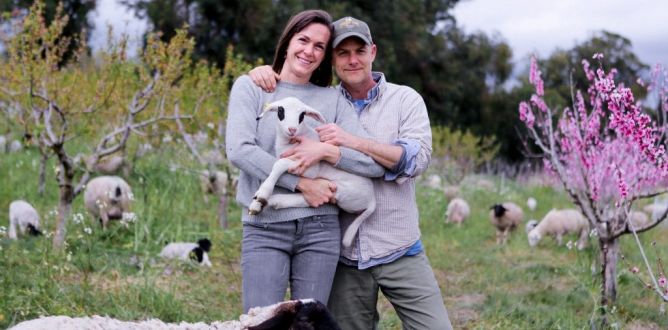The Biggest Little Farm: The Return Parent Guide
Too short and less satisfying than the first film, this is still an inspiring documentary about the wonders of nature.
Parent Movie Review
“This is a film of hope, love, joy, and rebirth. It is a secular hymn to the earth – a visual poem, a cinematic psalm.” Such was my opinion of The Biggest Little Farm, a moving documentary about John and Molly Chester’s spectacular success in bringing a dead farm back to life. Released in 2019, that inspiring film shared the Chesters’ commitment to natural farming methods and using biodiversity to solve problems. The radiant conclusion to their movie, wherein a thriving Apricot Lane Farms fully vindicates their philosophy, gives viewers hope for the future of agriculture. Now the Chesters are back in The Biggest Little Farm: The Return.
Fans of the first film need to adjust their expectations for this effort. This sequel isn’t a film; it’s a “special” and runs for just under half an hour. Some of that time is spent recapping the events of the first film before updating viewers on the last few years of happenings at Apricot Lane Farms. There’s good news – 160 different crops are now grown on the farm. And there’s sorrow: some of the Chesters’ animals are aging out of their ability to contribute to the farm. City dwellers may be able to avoid the harsh reality that underpins farming – every creature on the farm must contribute to its viability or their time is up. Thankfully, no animals are sent to the slaughterhouse during the film, but that fate is a dark cloud over the animals’ lives.
If you want to share this story with your children, it carries the same concerns as the previous film: dead animals. Animals are killed by predators and die in accidents. Their little corpses are visible on screen and this could disturb young or sensitive viewers.
Less sensitive viewers will probably enjoy this production, particularly if they watched its predecessor. The Biggest Little Farm is a truly wonderful documentary and I highly recommend it to everyone. As for this follow-up effort, it feels thin due to its short run time. If you are unfamiliar with the farm, please go back and invest the time in the original doc. If you couldn’t get enough of the Chesters’ inspiring story, you will appreciate being brought up to date on their work. You won’t enjoy the same breadth of story the first film featured, but you will find both heartwarming and heartbreaking moments and a sense of hope.
In a world where pandemic, war, and climate disasters can intensify our anxiety, listening to John Chester share his perspective is beneficial. “That resilience that exists within the natural world gives me so much hope. It’s just waiting for us to unleash its full potential….And while our farm may never reach a perfect harmony, it is alive with infinite possibilities. The ecosystem of our planet works the same way.” Spending 29 minutes of your life to soak up that message is likely time well spent.
Directed by John Chester. Starring John Chester, Molly Chester. Running time: 29 minutes. Theatrical release April 22, 2022. Updated January 13, 2024Watch the trailer for The Biggest Little Farm: The Return
The Biggest Little Farm: The Return
Rating & Content Info
Why is The Biggest Little Farm: The Return rated Not Rated? The Biggest Little Farm: The Return is rated Not Rated by the MPAA
Violence: Coyotes attack chickens: dead chickens are seen. Fires burn near the farm. Dead piglets are seen. A farmer stitches a piglet’s leg wound. A man buries a dead piglet. Insects die.
Sexual Content: None.
Profanity: None (but it’s possible there are some terms of deity that are not totally audible.).
Alcohol / Drug Use: None.
Page last updated January 13, 2024
The Biggest Little Farm: The Return Parents' Guide
You can learn more about John and Molly Chester’s farm here: Apricot Lane Farms
Los Angeles Times: Life on the “Biggest Little Farm”: behind the scenes of a biodynamic blockbuster
Home Video
Related home video titles:
This is a sequel to The Biggest Little Farm. You can also watch other short films about the Chesters’ farm here.
Gunda is a black & white documentary that takes a close-up look at a pig and her piglets, while also examining the lives of a rooster and cow on the same farm.
The biodiversity that benefits the Chesters’ farm is critical for the entire planet. In David Attenborough: A Life on our Planet, the famed British broadcaster and naturalist pleads for humans to preserve the biodiversity on which our planet’s health depends.

